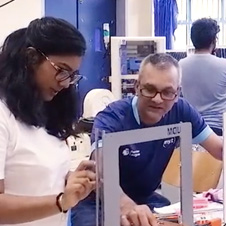To be able to cope with technological advances and complexities of industrial systems, graduates need to understand electrical, electronics and automation engineering along with good communication skills, health and safety issues.
Graduates can acquire and maintain a wide range of engineering products and processes. It aims to meet the increasing demand for technicians with cross-disciplinary skills, particularly in the field of control systems, electrical machines, networks, power systems and instrumentation.

Faculty of Sustainable Development and Engineering
Course Overview
To be able to cope with technological advances and complexities of industrial systems, graduates need to understand electrical, electronics and automation engineering along with good communication skills, health and safety issues.
Graduates can acquire and maintain a wide range of engineering products and processes. It aims to meet the increasing demand for technicians with cross-disciplinary skills, particularly in the field of control systems, electrical machines, networks, power systems and instrumentation.
Career Prospects
BSc (Hons) in Electrical Engineering & Automation is a degree that can help you to become anything from an electrician to a designer of electrical systems for cars, ships or spaceships, and any device or product that runs on electricity.
Successful students will be involved in creating, testing, securing and implementing all the elements of an electrical plant (such as switchgear, transformers, motors, cables, generators) and improving electric power generation. They can also be responsible for creating and operating industrial equipment such as boilers, turbines, generators, diesel, pumps, condensers, compressors, pressure vessels. Sometimes, electrical engineers get involved in the initial processes of designing power system facilities.

Entry
Requirements
EITHER Pass in: 3 subjects at A-level and 1 subject at subsidiary level at Higher School Certificate Examination
OR Pass in: 2 subjects at A-level and 2 subjects at subsidiary level at Higher School Certificate Examination
OR Pass in: 3 subjects at A-level at the London General Certificate Examination
OR any other acceptable equivalent qualification
Students must have studied Science/Technical subjects with passes preferably with passes in Maths and Physics ( or equivalent) at A level.
Course Structure
Semestre 1
- English
- Communication skills
- Fundamentals of Algebra and Trigonometry
- Fundamental of analytical Mathematics
- Mechanics – Electromagnetism
- Basic functions and components of electronics
- Research and implementation
- Inductors and transformers
- Linear circuits and components
- Control and command of industrial systems
- Analysis and synthesis of logical systems
- Algorithms, Programming
Semestre 2
- General and professional English communication
- Research and documentation
- Human, economic and social science
- Professional project
- Integral calculus and differential equations
- Elements of applied mathematics
- Optoelectronics / Thermal Physics
- Sensors / EMC
- Fundamental functions of electronics
- Information processing and transmission
- Research and implementation
- DC machines and rectification
- Converters
- Architecture of processing systems

Semestre 3
- General and professional English communication
- Communication skills
- Research and implementation
- Professional project
- Mathematical tools for Fourier analysis
- Mathematical tools for discrete signals
- AC machines
- Electrical distribution
- Distribution and security
- Second order systems, filters
- Networks
- Process supervision and control
- Control systems, Regulation
- Data base
Semestre 4
- Analytical Mathematics
- Linear algebra and applications
- Probability and Inferential Statistics
- Semiconductor
- Analog Telecommunications
- Digital Telecommunications
- Modeling and control of linear digital systems
- Corrections of continuous linear and digital systems
- End of second year Project
- Industrial internship (6 weeks minimum)
Semestre 5
- Mathematical Tool for Signal Processing
- Power Systems
- Written and oral skills
- Introduction to Finance
- Engineering Management
- Introduction to wave propagation
- Wave propagation
- Data Acquisition
- Power electronics
Semestre 6
- Securing Enterprise Network
- Renewable Energies
- SCADA
- Personal Project
- End of third year Project
- Industrial internship (10 weeks minimum)

How
to Apply
In addition to a completed application form:
– A letter of motivation
– Academic Results
– Copy of your CV detailing your work history if any
Location
Available at Rose Hill Campus

Any further inquiries?
Please contact on the following email: student@udm.ac.mu













